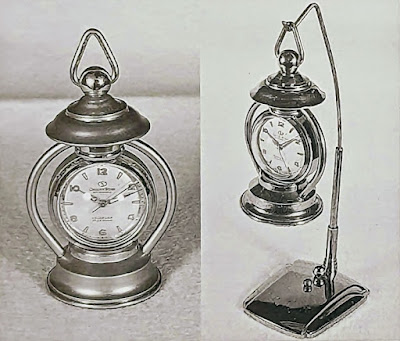A couple of months ago I wrote about the birth of Orient's T-S Type movement, and the "Hinomatic" watch built on it. Not long had passed since the 1955 launch of the Hinomatic, and in 1956 Orient introduced a new caliber, the T-Type, which would soon replace the T-S.
The
T-Type, too, did not last a long time in production before it was replaced by the
N-Type movement, in 1958. However, during its short life it provided the
basis for numerous important models and new designs, some of which were later
revisited in watches using newer calibers.
The
first and most notable – and popular – model was the Orient Star Dynamic. The
Dynamic started life as a fairly standard-looking watch, not much different in
appearance from the Hinomatic it replaced.
Having
similar looks and a movement that was, in essence, very similar to the T-S, one
could be fooled into thinking this was little more than a minor update to the
running production line.
However,
between 1957 and 1958, at which time the Dynamic line concluded, plenty of
fresh and innovative designs emerged.
At
first, Orient were to play with some fancier dial designs. These also presented
a more modern dress-watch style, suitable to the end of the 1950s – as opposed
to the Hinomatic's very "early 50s" looks. Differences may appear
subtle to us now, but at the time they were probably appreciated for consumers
looking for a more current design.
Then
Orient produced some more daring creations that went beyond just dial and
markers. One example is the "mysterious" watch, where the second hand
was replaced with a rotating disc that hid the hour and minute hands, and
created a special radiating effect. This design was later reproduced as a Royal
Orient.
Another
example is the "case within case" design, seen below on the right.
This style too was very unique to Orient, and was reused by the brand for its
Olympia Swimmer models in the 1960s.
If
that wasn't enough, Orient then went on and put the T-Type inside a triangular
case, to make its homage to the Hamilton Ventura. This was sold as both a wristwatch
and a pocket watch version, as you can see here.
The
case-in-case design also received its pocket-watch, or pendant version as you
can see below; and an even more unusual product was this table-clock Dynamic,
which resembles a lamp.
While
the Orient Star Dynamic was the main product line at the time, Orient
manufactured more models using the T-Type caliber.
The
Jupiter
model was presented in 1956, shortly after the Dynamic. It was initially
intended as a more basic watch: using versions of the movement having as little
as 9 jewels, while Dynamic models usually made use of the 17-jewel version. Later,
however, things got a little mixed up with 11 jewel versions appearing in both
the Jupiter and Dynamic lines.
In
1957 the Mars
Orient was introduced, as a higher end model, with finer regulation
and improved shock resistance. These watches used 19 and 21 jewel versions of
the T-Type, and the 21-jewel model also featured a higher level of finishing
throughout.
Another
watch worth mentioning that made use of the T-Type movement was the 1958 "Luminous"
with its battery and miniature light bulb, and the antimagnetic Para
Aimant. Despite being introduced along with the start of the
production of the newer N-Type caliber, these models took advantage of the smaller
dimensions of the older movement to pack more "technology" into their
cases.
Note, however, that most of the earlier models mentioned – the Dynamic, Mars and
Jupiter – had fairly small cases, ranging between 32-34mm. Take this into
consideration when looking to buy one of those.
Pictures
that appear in this post were taken from the 1999 Orient Watch Catalog
book, and old Orient sale ads.







They should bring all of them back with updated movement.
ReplyDeleteThere was actually a really faithful reissue of the "standard" Dynamic a few years ago. Too faithful in fact as they kept it at 35mm...
DeleteThe dial is amazing. Businessdor.com
ReplyDeleteThank you for your articles and thorough research. I hope, reissues of the Orient Dynamic come back some time.
ReplyDelete